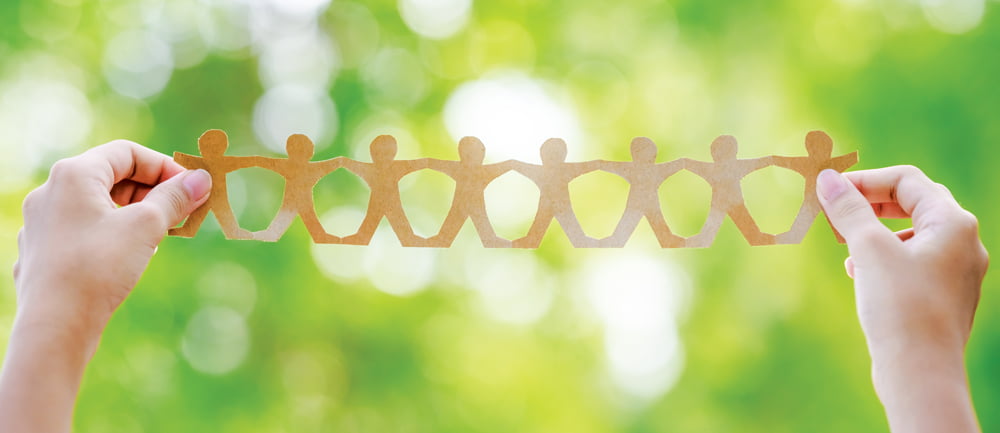If the past few years have taught us anything, it’s the power of connection and the importance of strong relationships. Throughout the changing pandemic restrictions, ANZA members continued to pull together to provide as much familiarity and routine as possible. The sense of togetherness kept many of us sane (and away from the banana bread/sourdough/gin).
Our sports groups were whittled down into tiny teams, Ladies Nights became cosy tête-à-têtes with strangers, Mahjong turned into mini meet-ups at someone’s home. But we all kept in contact and remained as affiliated as possible. Why? Because community is what drives our association, and it’s what also keeps us happy and healthy as human beings.
It’s no secret that good connections boost our wellbeing. Research shows that positive social connectedness can improve quality of life, promote better sleep, reduce stress and increase our ability to recover from anxiety and depression. Being part of a collective also provides opportunities for self-development and support. With others around we get to learn and share knowledge, whether that be gaining new skills or picking up everyday hacks such as where to find the best fried carrot cake to how to handle a tricky conversation with your boss.
“Humans are neurologically wired to connect with others from birth and have an innate need for togetherness and belonging,” explains Anne Sprosen, Counsellor at Alliance Counselling in Singapore (alliancecounselling.com.sg). “After the basics of sustenance, shelter and safety, it’s the most important need we have. We crave human contact in the same part of our brain as we crave food, and feel social rejection in the same part of our brain that processes physical pain.”

Craving connection
Creating meaningful friendships and maintaining them in adulthood isn’t always easy. Life is busy and carving out time to forge new relationships is not often high on our list of priorities. However, what sets expats apart when it comes to scouting out new acquaintances is the speed at which we are forced to let go of existing circles and create new ones. Says Anne, “It’s normal for our communities and those we connect with to evolve over time, but this is usually a gradual process. With expats, the transition of people coming and going can mean that friendships are formed, and also change, at a much harder and faster pace.”
No matter what your circumstances are, if you’re craving more connection in your life, you’re not alone. According to a global survey in 2022 by Statistica, about 33 percent of adults stated that they experienced feelings of loneliness. An often-cited analysis led by Julianne Holt-Lunstad, a professor of psychology and neuroscience, concluded that loneliness is as harmful to physical health as smoking 15 cigarettes a day.
But how to boost your social circle (without looking a bit weird)? Anne suggests looking to children for initial tips. “Kids tend to be more focused on the current moment than adults. This means they worry far less about what others may think of them or how an interaction might transpire,” Anne explains. “Adults often worry about how they will be perceived or judged by others, which often leads us to holding back part of ourselves.”
Indeed, through ANZA’s many young groups we see children making new pals constantly because being willing to be honest and show vulnerability is essential in forming meaningful connections. The good news is that being a member of the ANZA family (or at least knowing that we’re there if you need us) means that opportunities for community and connection are constantly available. After 75 years, offering support and friendship is what we do best!
Get yourself connected
Anne’s advice for forming & maintaining close bonds
- Reach out
Show you’re interested in connection. This could be through a text, phone call, or a post on a Facebook group. Or contact ANZA at info@anza.org.sg and we can point you in the direction of our groups. You aren’t going to connect with everyone, but the more people you initially bond with, the more likely you are to find your tribe. - Meet acquaintances in a new setting
If you normally see friends at the school gates, suggest meeting for a coffee, a yoga class, or a hike. Invite the family you chat with every week at ANZA Soccer over for a playdate, BBQ, or out to lunch. The more sides you show of yourself, the closer a relationship becomes. By meeting in a different context you’re sharing more about who you are. - Maintain regular contact
Interacting regularly is how we build and maintain relationships. Think about making a fortnightly or monthly plan, or make sure you schedule your next catchup before you leave the current one. Even just texting or replying to a text continues the interaction and builds relationships. - Stay open
To make true friends, you have to share about yourself and ask people questions, so that they share back. Don’t worry, we’re not asking you to unveil your deepest, darkest secrets. Start with your passions, how you spend your free time, or what you’re looking forward to, and ask them for the same. - Be brave
The thought of following these tips might make you cringe, but putting them into practice means doing things differently. To prevent anxiety about what might happen, try acknowledging your discomfort whilst reminding yourself why you’re doing it. Saying ‘This makes me really nervous but I’m doing it for me and a good life’ will help to boost your confidence.








